Manifold is the most popular... what?
Resolves to the most general answer that is technically, pedantically, correct.
As supported with data in the comments.
To avoid sniping existing answers with minor improvements: if your answer is a close relative of an existing answer, it should be no less readable / no less compact than the prior answer.
I suspect I'll be making a bunch of judgment calls here; I will not bet.
🏅 Top traders
| # | Trader | Total profit |
|---|---|---|
| 1 | Ṁ351 | |
| 2 | Ṁ90 | |
| 3 | Ṁ63 | |
| 4 | Ṁ36 |
People are also trading
I think I'm actually fairly convinced that Manifold is the most popular prediction market out there, at least as measured by web site popularity or visits. Presumably not by real-money-volume, but that doesn't seem like a great fit for the term "popular".
I don't think there exists a clear line between the stock market (especially certain options or option strategies), prediction markets, and sports betting. In practice Wikipedia seems to be using a more extensional definition, rather than a well-defined set of necessary and/or sufficient conditions, and that seems like a fairly good fit for what people mean when you say "prediction market".
In general, if you were talking to someone and said "Manifold is a prediction market..." and they said "oh, like draft kings?" I don't think anyone here would say "yes"; I think it would be more like "kinda, but..." or "like that, except..."; the sports betting sites are at least highly non-central examples of prediction markets, and the fact that they have much more limited scope of markets allowed is highly relevant to the interests of Manifold users.
Dipping a little into self-resolving territory here, but the market seems to think "prediction market" is more general / more compact / better than "forecasting platform/prediction market"; that matches my intuitive sense so I didn't really read much more into it.
I tried to restore manifold.markets to that wikipedia list but I didn't get away with that, It currently isn't there.
I will maintain that even though we are no longer listed on Wikipedia, we are still obviously a prediction market, and none of the gambling websites are prediction markets.
So "Prediction Market" remains the most general and pedantically correct answer.
@Joshua relevant edits described as
rm nonnotable markets
https://www.similarweb.com/website/gjopen.com/#overview ranks 1961008 compared to manifold markets at 68518. You need to select non notable more objectively
Rv blatant editorializing (which I think is a mistake assuming I was restoring editorialising when i didn't) but pointing this out, I just got more lectures:
We're getting into WP:NOTFORUM territory. If you have a reliable source to present that explains any differences (or that claims they are the same thing), feel free to present it and perhaps something can be added to the article. MrOllie (talk) 16:52, 25 November 2023 (UTC)[reply]
PS: On Wikipedia, most lists are kept to notable entries only. Which means WP:N here - it is shorthand for 'has a preexisting Wikipedia article'. This kind of restriction is necessary to keep lists from promoting obscure websites. Restoring stuff that has been judged to be nonnotable (for example by being deleted at a WP:AFD discussion) is particularly bad. MrOllie (talk) 16:56, 25 November 2023
Alright, well as long as we're removed for notoriety standards and not for not being a prediction market, I stand by my unqualified submission.
Non-Sports-Focused Prediction Market/Forecasting Platform
We do have quite a lot of sports markets here.
Intrade was a real money non sports focused prediction market. Intrade defunct now so manifold is currently more popular, but does it have to be most popular ever?
nerd facebook
Hmm There must be some social media or similar which is more nerdish and more popular. Wikipedia maybe?
Simulated investment platform
So if it is gambling it isn't investment. Right got it, I am sure that is believable even if I am not sure it is justifiable in a similar manner to sport betting not being a prediction market. But manifold has lots of sports markets.
Oh yeah, is the game monopoly a simulated investment platform?
Non-Sports-Focused Prediction Market/Forecasting Platform
We do have quite a lot of sports markets here.
We do, but it's not our foucus. This answer distinguishes Manifold from gambling websites, while still including polymarket, metaculus, etc. I think that drawing that line is really the only thing this market is about, because we are the largest of that group and that group is the most general description of manifold that's possible.
Website that offers suggested probabilities for a large number of disparate things including things that are impossible.
I suspect this might be true. Betting site are excluded as they rarely if ever offer odds on impossible things like Will this question resolve no.
I think this might be more general than prediction markets in that you can suggest a probability without a market being involved with deriving that probability. There are expressed doubts about prediction market being true due to sports betting.
Data to back this up - hmm not sure I have anything to add other than already provided data in the comments.
1 Websites don't think they just run code.
2 Now it is 5%
3 Seems rather specific, what proportion of websites express such an opinion?
;)
Actually screw it, I'm gonna one-up myself. Wikipedia is right. Gambling websites are a different thing from prediction markets. You could maybe call a gambling site a "forecasting platform", so I think that previous answer is wrong.
But Manifold is the most popular prediction market.
@Joshua I think this is the clear leader for generality (and conciseness / compactness) if it's actually justified! It's late here and I haven't read all the comments yet, but if we can actually justify that claim that would be awesome.
Website rankings are very clear, in addition to the monthly visitor stats I posted below!
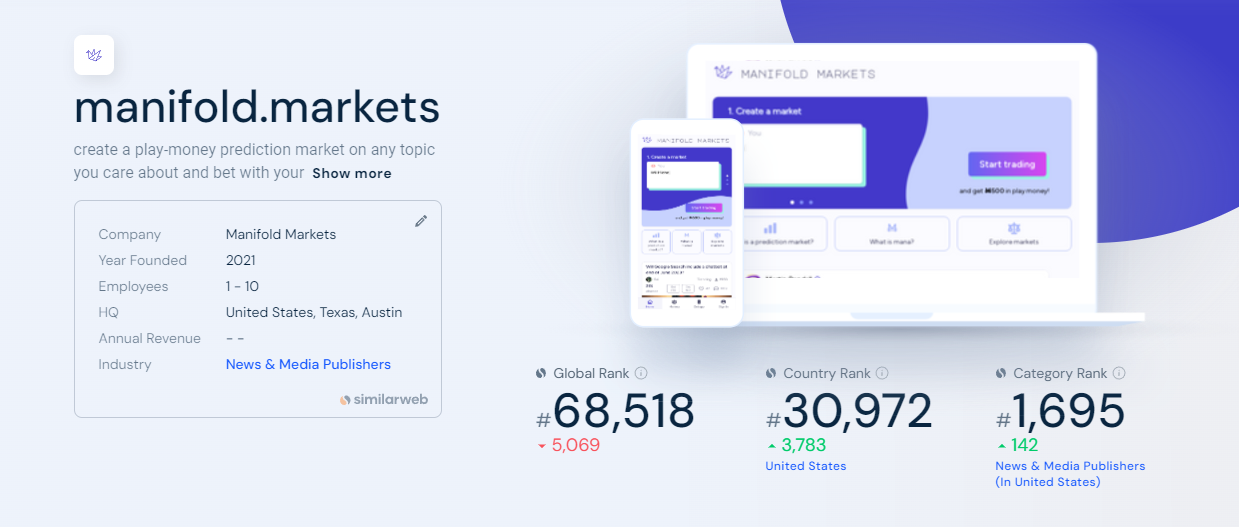

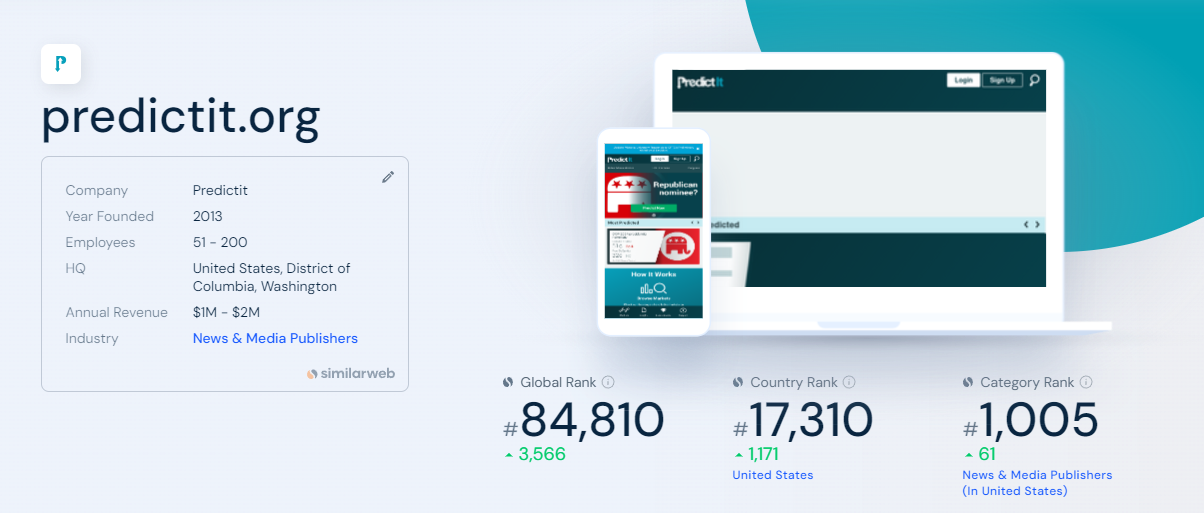

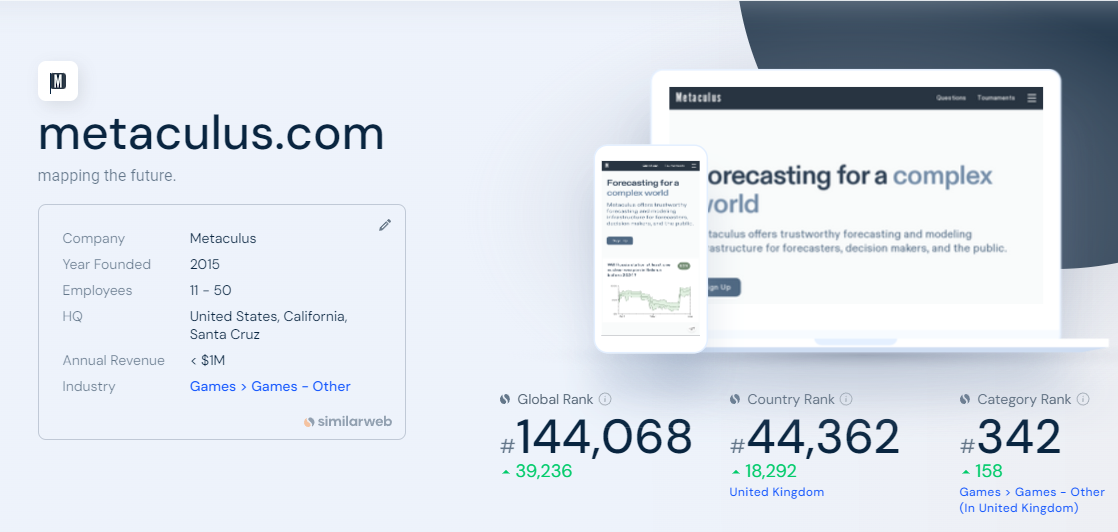
If anyone says that gambling websites are prediction markets, I dare them to go try to add them to the Wikipedia page.
@Joshua I have tried editing in what I hope is a NPOV comment. Lets see how this is treated.
It can be argued that sports betting markets are an example though some people appear to want to distinguish gambling from markets set up to elicit information. Without giving an opinion on whether sport betting is the most common and major example of prediction markets, this article concentrates entirely on markets other than for sports gambling.
Didn't last long but the explanation was
:Some prediction markets do include sports, so they certainly should not be excluded. The article definitely should not contain editorializing about the subject, as was just added. [[User:MrOllie|MrOllie]] ([[User talk:MrOllie|talk]]) 15:50, 25 November 2023 (UTC)
I think that being intended to create accurate forecasts rather than just provide a place to gamble is indeed the thing that distinguishes prediction markets from gambling sites.
@Joshua And the reality that the two things essentially do exactly the same thing, attracts the same sorts of people or at least there is a large overlap, that it potentially has the same benefits of getting better predictions and the same drawbacks of potential causing addiction/spending too much time and/or money than is sensible or healthy for some participants ....
are just inconvenient facts that shouldn't get in the way of the opinion you are stating?
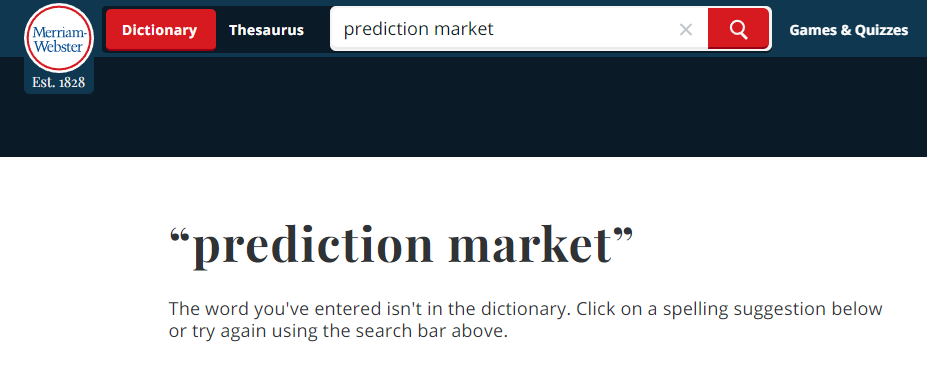

I don't want to get into what I think the definition of the term should or shouldn't be, but just what it currently is. It's not a well-defined enough concept to be in the flagship dictionaries, so we can't go by that.
I think in such cases Wikipedia is the most reliable source for the definition of the term, and Wikipedia currently lists all the things that we typically think about as actual prediction markets and does not list sports gambling websites.
Maybe you win your case on the Talk Page and get the term prediction market re-defined! But as of market creation Wikipedia thinks that prediction markets are only the things we usually describe as prediction markets, so pedantically that is the correct answer to resolve to in my opinion even if the term is later expanded to include gambling websites.
@ChristopherRandles I think that the page for prediction markets is more authoritative than this subsection of an article on a book from 2004, written before the existence of the things we now call prediction markets. The Wikipedia article for Betfair itself does not list it as a prediction market.
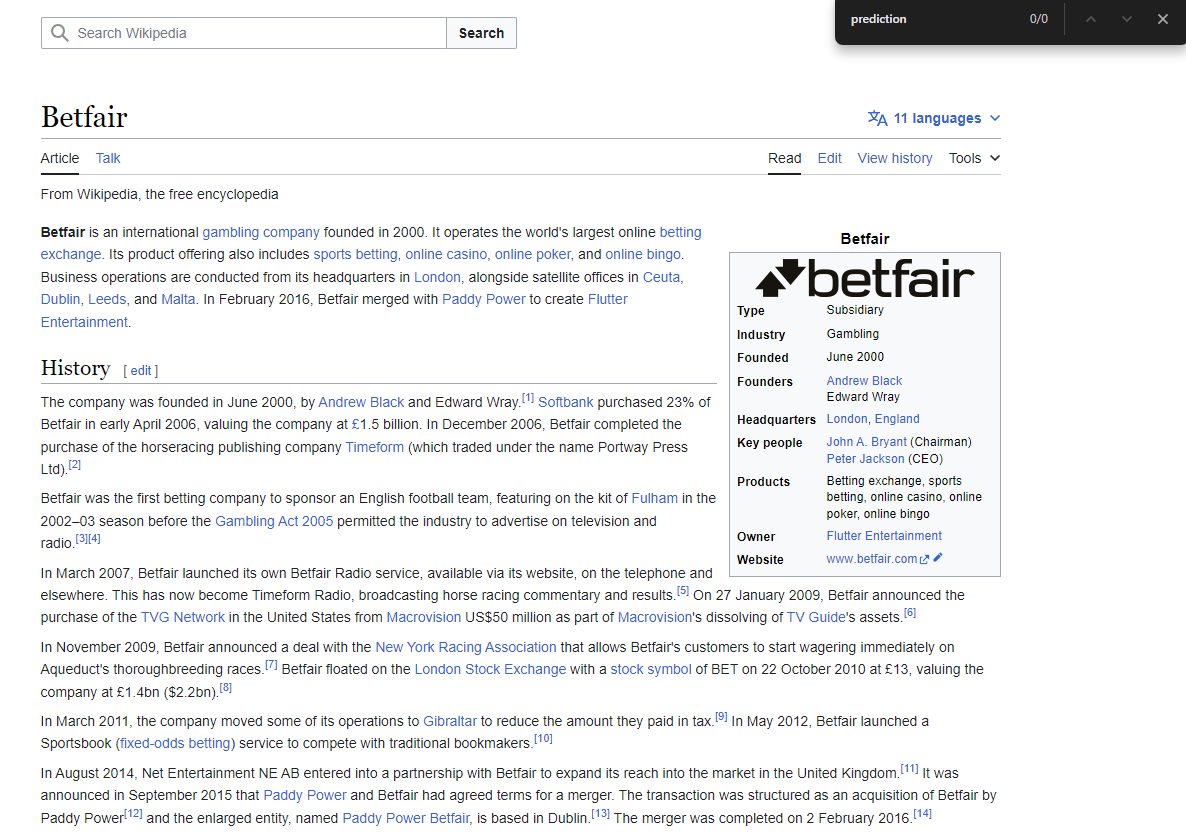
@Joshua I will begrudgingly add "Non-Sports-Focused Prediction Market/Forecasting Platform as an option to consider, but I stand by the main prediction markets article being authoritative.
@Joshua >"2004, written before the existence of the things we now call prediction markets"
lol
There was betting on the next pope in 1503. If by "things we now call prediction markets" you mean websites then foresight exchange is barely still running but it shows all trades dating back to 1994 http://ideafutures.com/fx-bin/Ticker?claim=CFsn
Searching scientific literature on prediction markets would take some time so I tried
From the scientific literature on prediction markets only, do researchers think sports betting is an example of a prediction market?
ChatGPT
Prediction markets and sports betting share similarities, but they are distinct concepts with different purposes and characteristics. While both involve making predictions about future events and have an element of risk, their underlying mechanisms, goals, and structures can differ significantly.
Prediction markets are often designed to aggregate and reflect the collective wisdom or information of a group of participants regarding the likelihood of specific future events. They are used in various domains, including finance, politics, and technology. Participants trade contracts representing different outcomes, and prices of these contracts are determined by the market based on the perceived probability of each outcome.
In contrast, sports betting typically involves individuals placing wagers on the outcome of sporting events. The odds set by bookmakers reflect their assessment of the probability of different outcomes, but these odds may also be influenced by factors such as the betting behavior of participants and the bookmaker's profit margin.
In the scientific literature on prediction markets, researchers may recognize sports betting as a form of prediction market, albeit one with unique characteristics. Some may emphasize the differences between traditional prediction markets and sports betting due to factors like bookmaker margins, the role of chance in sports outcomes, and the influence of public sentiment on odds.
It's important to note that the terminology and perspectives on these topics can vary among researchers, and the field evolves over time. If you're interested in the most up-to-date and nuanced perspectives, it's recommended to consult recent scientific literature or experts in the field.
